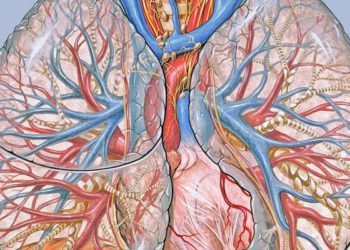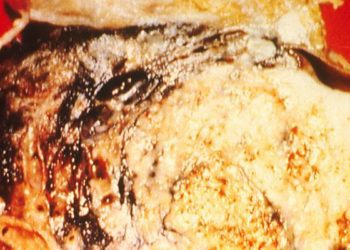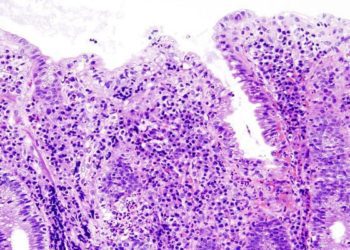Collaborative care model reduces depression in lung cancer patients [SMaRT Oncology-3 Trial]
1. Treatment of depression in patients with lung cancer using a collaborative care model resulted in significantly lower depression severity ratings than in patients treated using usual care by their primary care physician.
2. Lung cancer patients treated with a collaborative care model also reported improvements in self-rated depression, anxiety, quality of life, role functioning, and perceived quality of care.
Evidence Rating Level: 1 (Excellent)
Study Rundown: Patients with lung cancer experience high rates of major depression, which can negatively affect their functioning and quality of life. However, depression is often inadequately treated, as standard treatments for depression that are effective for the general population may not be effective in cancer patients. The authors of this study previously developed a collaborative care model that integrated depression management into cancer care, which was shown to be effective for cancers with a good prognosis. In this study, the authors sought to apply this depression care model towards patients with lung cancer and compare it to the usual method of care.
The results showed that the average depression severity rating was significantly lower in the depression care group compared to the usual care group. Patients in the depression care group also reported improvements in self-rated depression, anxiety, quality of life, role functioning, and perceived quality of care. Strengths of this study included the recruitment of patients from lung cancer clinics serving a large sample population, good participation, and good treatment adherence. Limitations included a small sample size due to the proof-of-concept design of the study, participants and their primary care physicians were not blinded, and the depression care model was composed of many elements which could not be individually assessed for their effectiveness in this study. The authors concluded that patients with cancers having a poor prognosis can be successfully treated for comorbid depression, but larger trials are needed to further determine the effectiveness in this population.
This study was funded by Cancer Research UK and Chief Scientist Office of the Scottish Government.
Click to read the study, published today in The Lancet Oncology
Relevant Reading: Management of depression for people with cancer (SMaRT oncology 1): a randomised trial
In-Depth [randomized controlled trial]: Symptom Management Research Trials (SMaRT) Oncology-3 was a parallel, two-group, multicenter, randomized controlled trial in three cancer centers in Scotland from 2009-11. Adults with primary lung cancer and a predicted survival greater than 3 months, as well as major depression diagnosed for at least four weeks, were included in this study. The collaborative care model consisted of cancer nurses, psychiatrists, and the patient’s primary care physician working together to educate patients, supervise treatment, and prescribe medications. Usual care consisted of their primary care physician treating patients as they normally would for depression. The primary outcome was a measure of each patient’s depression severity averaged from their initial questionnaire until they were no longer able to participate, up to a maximum of 32 weeks. The severity was measured by the Symptom Checklist Depression Scale (SCL-20), version B.
142 patients were randomly assigned to the depression group (n=68) or the usual care group (n=74). The median time from lung cancer diagnosis was 7.1 months (Interquartile range [IQR] 3.6-15.0). The average depression severity for patients in the depression care group was 1.24 (Standard Deviation [SD] 0.64) vs. 1.61 (0.58) in the usual care group, representing a difference of -0.38 (95% CI -0.58 to -0.18), equivalent to a standardized mean difference of -0.62 (-0.94 to -0.29). Additionally, 27 (51%) of 53 patients in the depression group achieved a ≥50% reduction in the SCL-20 score baseline compared to 9 (15%) of 60 in the usual care group at 12 weeks (absolute difference 36%, 95% CI 20-52%; odds ratio 5.88, 95% CI 2.42-14.33; p<0.0001).
More from this author: New dengue fever vaccine effective in phase 3 trial, Insulin pumps more effective than multiple daily injections in type II diabetics [OpT2mise trial], Heart attack hospitalization rate in China quadruples from 2001-2011, Vitamin D supplementation does not reduce risk of falls, ¹⁸F-FDG PET brain imaging could predict recovery in vegetative patients
Image: PD
©2012-2014 2minutemedicine.com. All rights reserved. No works may be reproduced without expressed written consent from 2minutemedicine.com. Disclaimer: We present factual information directly from peer reviewed medical journals. No post should be construed as medical advice and is not intended as such by the authors, editors, staff or by 2minutemedicine.com. PLEASE SEE A HEALTHCARE PROVIDER IN YOUR AREA IF YOU SEEK MEDICAL ADVICE OF ANY SORT.









